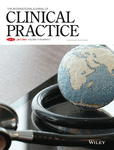Astodrimer gel for treatment of bacterial vaginosis: A systematic review and meta-analysis of randomized controlled trials
Abstract
Background
Bacterial vaginosis is a frequent source of vaginal infection among reproductive-aged women. Astodrimer gel is a novel drug which demonstrated favourable outcomes for treatment of patients with bacterial vaginosis.
Aim
We attempted to conduct a systematic review and meta-analysis of all randomized controlled trials (RCTs) which examined the efficacy and safety of astodrimer gel in patients with bacterial vaginosis.
Methods
We searched four databases from inception to August 15, 2020, using relevant keywords. We identified all RCTs which surveyed the efficacy and safety of astodrimer gel in treating patients with bacterial vaginosis. We appraised the quality of the included RCTs using the Cochrane risk of bias assessment tool. We pooled dichotomous outcomes as numbers and totals and reported them as risk ratios (RR) with 95% confidence intervals (95% CI) under random- or fixed-effects meta-analysis models depending on heterogeneity.
Results
Three eligible studies comprising four independent RCTs and 1165 patients were identified (614 and 551 patients received astodrimer gel and placebo, respectively). For efficacy outcomes (n = 320 astodrimer gel versus n = 260 placebo), astodrimer gel was significantly superior to placebo for all pooled efficacy outcomes, including clinical cure rate (at 9-12 and 21-30 days), microbiological Nugent cure rate (at 9-12 and 21-30 days), patient self-reported absence of vaginal odor/discharge (at 9-12 and 21-30 days), resolution of Amsel criteria (at 9-12 days) and percentage of patients who did not receive rescue therapy during study. With respect to safety outcomes (n = 614 astodrimer gel versus n = 551 placebo), astodrimer gel demonstrated equal tolerability to placebo for all pooled safety endpoints, expect unfavourably for vulvovaginal candidiasis and treatment-related vulvovaginal candidiasis.
Conclusions
Astodrimer gel is effective in treating bacterial vaginosis and corroborated by clinical (Amsel criteria) and microbiological (Nugent score) measurements as well as patient-reported symptoms. Moreover, astodrimer gel is largely safe and associated with marginal rate of vulvovaginal candidiasis.
Open Research
DATA AVAILABILITY STATEMENT
All data are available in the manuscript.




